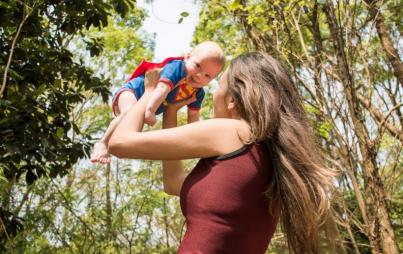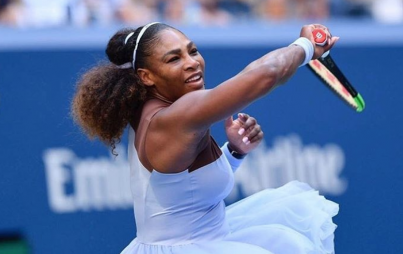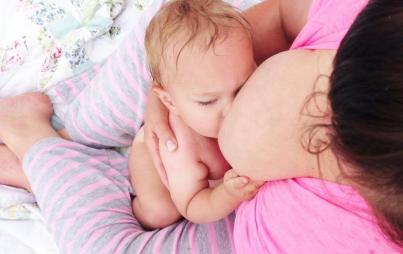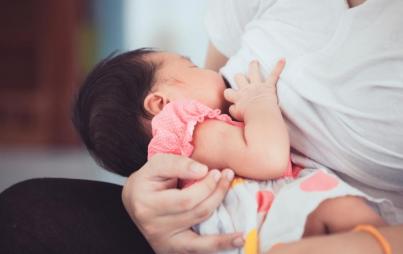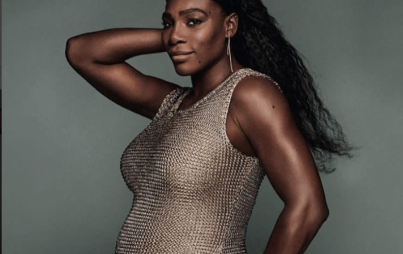![By si.robi (Williams S. WM16 (20)) [CC BY-SA 2.0 (https://creativecommons.org/licenses/by-sa/2.0)], via Wikimedia Commons By si.robi (Williams S. WM16 (20)) [CC BY-SA 2.0 (https://creativecommons.org/licenses/by-sa/2.0)], via Wikimedia Commons](/sites/default/files/images/article/2019-06/Serena%2520.png)
By si.robi (Williams S. WM16 (20)) [CC BY-SA 2.0 (https://creativecommons.org/licenses/by-sa/2.0)], via Wikimedia Commons
It was heart-wrenching watching Serena Williams make the difficult choice to wean her seven-month-old daughter in the HBO docuseries Being Serena. She was trying to make a comeback after the already amazing feat of winning the Australian Open in her first trimester of pregnancy. I spent my first-trimester moaning and nibbling on dry crackers.
I cringed when I watched Serena’s coach — a man, mind you — lecture her that if she wanted to compete at the highest athletic level, she must stop breastfeeding, enabling her to lose the extra weight that impeded her ability to run fast enough on the court. His delivery and mansplaining painfully reminded me of the demeaning coaches and bosses of my past. But in theory, he was right.
Motherhood means giving up one thing to get another.
In my ninth month of pregnancy, my husband kept “encouraging” me to give birth before his upcoming, impossible-to-reschedule business trip. As if I had that kind of power and control. And he wasn’t even a macho kind of guy. He was equally comfortable fixing a leaky faucet as he was making marinara sauce from scratch in our kitchen. He turned into a devoted, hands-on Dad who paced in the middle of the night with a baby on his shoulder, soothing her to sleep. He learned to change diapers even though he hadn’t had a role model in his own dad.
Our baby complied and did arrive early, after 31 hours of labor. I was hooked up to Pitocin and allowed to eat only ice chips, astounded that a nurse offered my husband a binder full of take-out menus and showed him how to nap in the solarium by pushing some chairs together. He flew the nursery coop a week later on his business trip, leaving me behind with my mother-in-law. But that’s a whole other story.
Three weeks after my daughter was born, I breastfed her in my living room, timing it so I could button up my blouse and sprint, like a breathless tennis player rushing to the net, to spend two hours in a classroom. Miraculously I transformed from an engorged milk producer who soothed my lumpy breasts with cucumber slices, into a creative writing professor hoping to overcome “mommy brain.”
You Might Also Like: Money Does Not Prevent Depression — But It Probably Makes It Easier To Survive It
Serena took a seven-month maternity leave. My maternity leave was fortuitously giving birth a week before spring break, postponing my class the following week with the promise of a make-up session, and subsequently resuming my weekly teaching schedule, hoping my nursing bra was fully clasped. Hoping I’d remembered to actually button my blouse. Hoping I was wearing clothes and not pajamas. I dashed out of the classroom ahead of my students. Back home, I arrived just in time to nurse my ravenous baby again.
Those months were a blur of round-the-clock feedings, sleepless nights, and wheeling my baby’s carriage to lull her to sleep, my bloodshot eyes stinging with fatigue. I was trying to fit my baby into my professional and married life — my own comeback, albeit much less splashy than Serena’s. No one made a docuseries about my superhuman efforts. Nor would I have wanted to be filmed, like Serena, attached to two breast pumps, in full view of the world.
Watching Serena Williams’s difficult pregnancy, health scares, and how she fell in love with an infant, I saw her as a mere mortal for the first time.
Not the powerful server so ensconced “in the zone” that she seemed otherworldly, distant, icy, even vacant. She had a temper, could break rackets in frustration and curse out lineswomen, but I didn’t see her truly soft side until she had to make the tearful decision to give up breastfeeding to climb back to the top of her demanding athletic career. I identified with her ambivalence, even if I wasn’t the driven superstar she was.
She wasn’t just making a comeback to play tennis again. “I’m coming back to win,” she confidently stated.
Getting through teaching a two-hour class as a nursing, sleep-deprived mom, was my version of winning. No trophies. No press conferences. No autographs.
Few female athletes have reached the top of their game after childbirth. Men, like Roger Federer with four children, don’t have the same problem.
Serena was the one who felt torn. Her husband, Alexis Ohanian, the billionaire co-founder of Reddit, left wife and baby for a three-week trip across the country to return to work. Yet when Serena’s coach said she had to go to France to train rigorously for a month before the French Open, she refused to leave her baby behind as he advised.
Her husband returned from three weeks away saying he missed the baby. I believe he meant it, but his words didn’t have the same emotion when Serena debated whether she could part with her baby for a month. She couldn’t do it. She wouldn’t.
Are women hard-wired to bond differently with our babies?
I thought about a hamster I adopted for my daughter when she was seven. Her friend’s hamster had just given birth, and the father began eating his young. The surviving babies were put in the bathtub for safety, and the father was sequestered in his cage.
I’m not insinuating that human males want to eat their young. But the reality is that more men than women abandon their children. And mothers are judged more harshly by society when they do.
Today men continue to evolve into a broader version of the gender-stereotyped fathers of past generations. But it’s still women who have more conflicts about their roles as mothers, and no matter how wealthy or successful we are, it’s unrealistic to believe that any of us can “have it all.”
I weaned my daughter at seven months, just like Serena.
The hormones were interfering with my health, and my doctor (a male) suggested (more gently than Serena’s coach) that I stop, having already given my baby a substantial nutritional and immunity boost.
“I’m going to miss this,” Serena said about breastfeeding, as the film crew showed her packing to leave for training, in a huge walk-in closet with a hundred pairs of designer shoes.
“I’m going to miss this,” I told my daughter, choosing between well-worn sneakers and my one pair of sandals to walk away from a nursing bond I never imagined would be so intense.
Both of our babies thrived afterward on formula. “I like mother’s milk better,” Serena wistfully told Olympia, encouraging her to take a bottle.
I hid in the kitchen while my husband fed our baby a bottle, hoping she’d adapt more quickly if I weren’t close by.
Serena returned to tennis, playing what looked like the top of her game again in the French Open — only to retire with an injury mid-way through the tournament. I felt her deep disappointment to give up something and not get the other. All mothers have been there, in large and small ways. We both had tears in our eyes.



